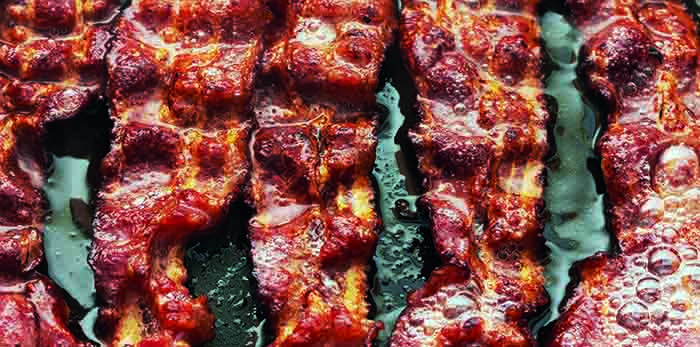The British Meat Processors Association (BMPA) has highlighted the ongoing work within the pork supply chain to reduce nitrite levels in bacon, in response to fresh calls to ban the chemicals.
But it has also stressed that current usage of nitrites remains well within safety limits set by the authorities. The BMPA’s comments come after calls by leading food scientists and a cross-party group of MPs and peers ministers to ban the use of the chemicals in bacon because, they say, it heightens the risk of several forms of cancer.
Nitrate and Nitrite have been used for centuries in curing and preserving meats, and sodium and potassium salts of nitrite and nitrate (E249-252) are authorised food additives in the EU. About 90% of bacon sold in Britain is thought to contain nitrites, although some companies already make nitrite-free bacon, including M&S, Waitrose and Better Naked.
Nitrites are used in meat products to extend shelf life by inhibiting microbial activity, particularly Clostridium botulinum, which can cause foodborne botulism, a potentially fatal disease. Nitrites also give cured products such as bacon and ham their pink colour.
Conservative MP Dr Daniel Poulter, a former health minister and a practising NHS doctor is leading the calls to ban nitrites, along with others including Labour MP Rosie Cooper, the SNP health spokesperson, Martyn Day, and the Liberal Democrat peer Lady Walmsley.
The move is also being supported by Prof Chris Elliott, the director of the Institute for Global Food Safety at Queen’s University in Belfast, who led the government’s investigation into the horsemeat scandal, and Prof Denis Corpet, an expert on the links between nitrites and cancer.
They have written to Steve Barclay, the new health secretary, and Prof Sir Chris Whitty, the government’s chief medical officer, calling for meat producers to use more natural alternatives to nitrites that perform the same role during curing.
According to a report in the Guardian, the letter says that: “Studies carried out by the World Health Organization, UK, US and European universities, and even the UK government’s own agencies suggest a link between the consumption of nitrite-cured meat and bowel cancer, the cause of over 10,000 deaths in the UK every year.”
It urges ministers to pass ‘legislation to ban the use of nitrites in food production and remove a potential health hazard that consumers are worryingly unaware of’. “Given advances in food manufacturing mean we can get the familiar colour and flavour of our bacon without nitrites, there is simply no good reason not to do this.”
Prof Elliott said: “Nitrites are found in many foods and can be perfectly harmless. But when they are used to cure bacon, and that bacon is then cooked and ingested, they produce carcinogenic nitrosamines in the stomach.”
Actively engaged
A BMPA spokesperson said: “The ongoing work to reduce nitrites in cured pork products is one that the British meat industry is actively engaged in.”
It explained that the UK processing industry strictly adheres to the EU regulations and keeps nitrite and nitrate levels within the legal limits.
The European Food Standards Agency (EFSA) concluded in 2017 that consumer exposure to nitrites and nitrates as food additives is within safe levels for all population groups, except for a minor exceedance in children whose diet is high in foods containing these additives.
“The importance that the industry places on producing safe, quality food cannot be understated. Processors take serious responsibility for providing safe food for the consumer and strive to continuously improve. Any changes to production will always be based on rigorous science-based evidence and thorough testing,” the association said.
The industry has formed a committee of processors, retailers and academics that are reviewing levels of nitrites and nitrates and is exploring collaborative research opportunities with a number of institutions. It is in regular dialogue with the FSA to keep them informed of developments.
The industry has also committed to an annual data collection and review of nitrites and nitrates in pork products, to track progress. Processors have already made significant historical progress, and this year alone some processors have reduced their ingoing nitrites by up to 60%.
The Food Standards Agency hinted that a ban was unlikely, according to the Guardian. Rick Mumford, its head of science evidence and research, said: “Nitrites are important preservatives which hinder the growth of harmful organisms, in particular the bacteria responsible for botulism – which can be life-threatening.
“Because of the possible link between eating too much of red and processed meats and bowel cancer, the government recommends limiting consumption of these products to 70g per day.”




